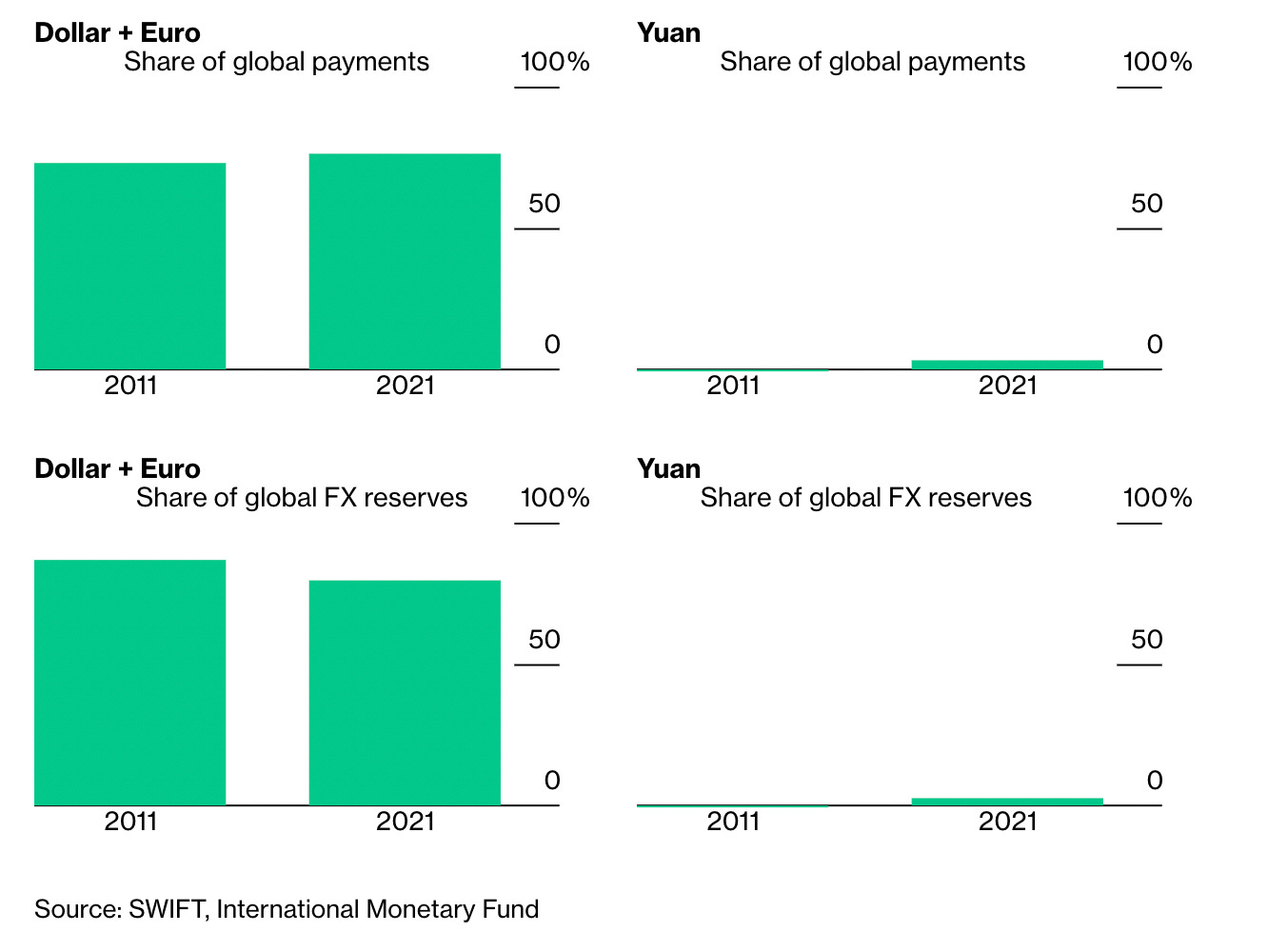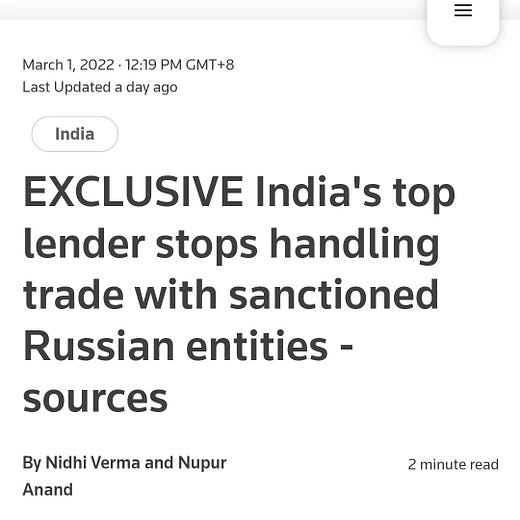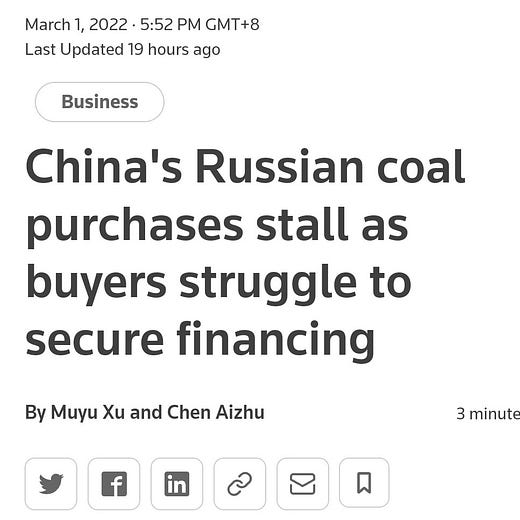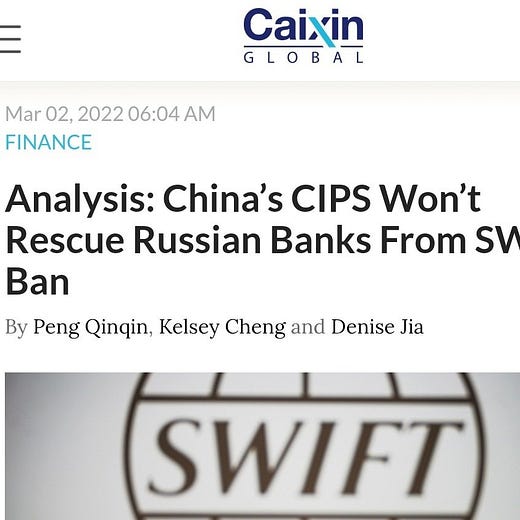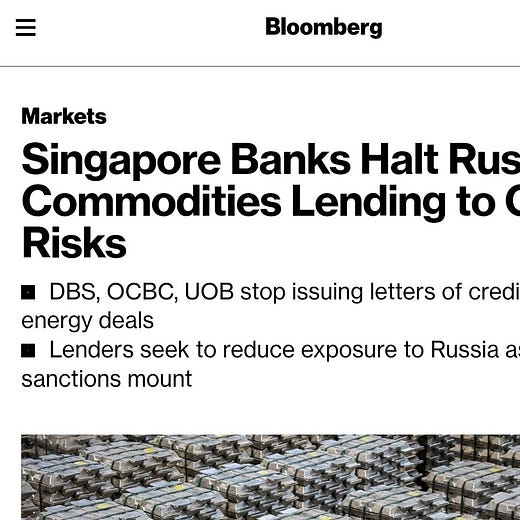Bluster and Tantrums Aside
We live amid the ascendance of China and the decline of the West – so the narrative goes – but as Russia, and China, are discovering, follow the money and the West still runs the show.
As Bloomberg puts it, the world “is cleaving into two blocks, as an ascending China and declining US clash over trade, technology and the pandemic.”
After Vladimir Putin’s invasion of Ukraine and the sanctions it provoked from the US and allies, that divide appears sharper than ever — but the contest also looks more uneven. The economic isolation imposed on Russia has been a stark reminder of the persistence of American power.
“The locus of financial power still remains very firmly in the hands of the West,’’ says Eswar Prasad, a Cornell University economist who’s spent years studying China’s challenge to the greenback.
That’s been apparent as the US and its allies in Europe and Asia coalesced around an ever-tighter series of sanctions after Putin sent his troops into Ukraine. They’ve severed Russia from the world economy so profoundly that the effects may be felt for years.
For Xi Jinping, Russia’s Ukraine adventurism is a stark reminder that there’s more to global power than GDP and trade numbers and spending on arms. The Chinese yuan is basically a non-entity in terms of global trade:
For the West, this is a distinct advantage but it doesn’t necessarily equal victory – far from it. Adam Posen, president of the Peterson Institute for International Economics, told Bloomberg he calls it the “corrosion of globalization.’’
He says it began with President Donald Trump’s trade war with China, and continued through the pandemic as economies turned inward. Now it’s accelerated.
“Everybody has been talking for a long while about blocs and the global economy splitting up,’’ says Posen.
He was skeptical before. Now, he thinks, “the stopped clock is finally right’’ — and the eventual result will be a global economy that’s less productive and innovative as it turns combative, with consumers everywhere paying a price.
There are other complicating factors. China’s economy is far more intertwined with the global economy than Russia’s is and its exports continued to break records during the pandemic – five times faster than the global average, while foreign direct investment there increased even as it was falling elsewhere, writes Bloomberg.
Giving up all that to join Russia in an economic fight with the West right now ‘would be bad news for China,’’ says Hui Feng, a senior lecturer at Griffith University in Queensland, Australia and co-author of The Rise of the People’s Bank of China. ‘It will be supplied with cheap Russian oil and other energy products. But it will suffer from a structural decoupling in technology and investment.’’
The financial ramifications are spooling out faster than most imagined:
Notes the Wall Street Journal:
For China, the most alarming aspect of the crisis is probably its financial implications. The joint decision by the European Union, the US, the UK, Japan and Canada to sanction Russia’s central bank—pummeling the ruble and freezing access to many of the foreign assets the Central Bank of Russia would need to defend it—sets a very tough precedent for any potential future crisis in the Taiwan Strait.
It should also be noted, as is the case with Ukraine, that Taiwan under attack would become a global cause célèbre. China is not claiming territory overlorded by a Sauron-like generalissimo – the “evil, venal” Chiang Kai-shek (I’ve personally never been able to figure out how he was any worse than Mao Zedong, who presided over tens of millions of deaths, but that’s another story). China would be attacking a multi-party democracy with a free press, religious freedom, legalized gay marriage and increasingly popular street snacks and cycling trails.
A lot of the talk lately has been, China’s watching Ukraine because it’s got its own invasion it has to get around to at some point. But already China’s looking at far more than Ukraine. The logistics of war, as it turns out, are just one of countless possible downsides for a risk-averse rising state like China. And like China, we’ll all be watching them play out over the weeks, months and years ahead.
Is China Going to Blink on Zero Covid?
That’s the word in some quarters; it’s disputed elsewhere.
The Wall Street Journal reports:
‘In the near future, at an appropriate time, there will be a Chinese-style roadmap for living with the virus,’ Zeng Guang, China’s former chief epidemiologist at the Chinese Center for Disease Prevention and Control, wrote on China’s Twitter-like Weibo .
Chinese health officials have been closely monitoring Hong Kong, where an Omicron outbreak has spiraled our of control despite stringent border controls and social-distancing rules, and is spreading quickly among the city’s unvaccinated elderly.
Mainland experts now see the former British colony as a “stress test scenario,” as well as a source of data on the effectiveness of various treatments and insight into fighting severe infection surges without resorting to hard lockdowns, according to a person familiar with the discussions.
But the reality is that this is a very contentious issue both in China and in Hong Kong:
Once they start bringing out the hypnotherapists to defend public policy, you know they’re serious.
Just yesterday, according to the South China Morning Post, Guo Weimin, spokesman for the Chinese People’s Political Consultative Conference, defended the PRC’s zero-Covid policy, “saying they showed the political system’s ‘superiority,’ amid calls for the policy to be adjusted.”
Guo apparently went on to say that zero-Covid “actualized the people-based political ideology and the superiority of our nation’s socialist system.”
Whether Guo is making any sense at all, it would obviously still be foolish to expect or hope for an overnight turnaround on China’s strict Covid regulations. There’s too much at stake for any CCP-associated individual or committee to commit to a new course of action.
Other News
Peng Shuai’s tennis career is over, she’s probably under some kind of house arrest, and the entire sordid story should continue to be China’s shame, but reports the New York Times, the Women’s Tennis Association now has a title sponsor after more than a decade without one;
The Women’s Tennis Association confirmed that it has agreed to a multiyear deal with Hologic, a leading global medical device and diagnostics company focused on women’s health.
The Cyberspace Administration of China (CAC), the PRC’s most powerful internet regulator, has decided it’s time to do something about these viral memes of women in chains and other issues that make China look like less than the freshly scrubbed socialist paradise it would have us believe it is.
Reports the South China Morning Post:
China’s powerful internet regulator has drafted a new law to restrict push notification on topics such as sensitive news items, disasters and celebrity gossip in a new effort from Beijing to curb Big Tech’s power in shaping public discourse.
The new rules make service providers responsible for the content of their push notifications, which must “adhere to the correct directions of politics, public opinion and values” and help “develop a positive and healthy network culture”. It is another escalation from the national government to restrict online content to what the state deems “healthy”.
With tech companies like Apple and TSMC suspending sales to Russia, South Korean businesses like Samsung – the No 1 smartphone brand in Russia – are faced with a dilemma, reports Business Korea: halting sales to Russia would probably hand the No 1 smartphone spot to Chinese rival Xiaomi.
As of the end of October 2021, Samsung Electronics ranked first in the Russian smartphone market with a 34.5 percent share, more than twice as high as that of Apple (14.7 percent). If Samsung suspends product sales in reality, it will suffer greater damage than Apple and Chinese smartphone manufacturers such as Xiaomi may take the No. 1 spot in the Russian market.
Tik Tok is in the invidious position of balancing varying rules coming out of Brussels, Moscow and Beijing, which the South China Morning Post notes “highlights the challenges of operating a global platform in a divisive world.”
“Divisive” is certainly one way of putting it.
An amateur investing frenzy is underway in China, reports the Financial Times. Punters are betting on what they’re calling “Sino-Russian trade concept stocks” based on the assumption that trade will increase between China and Russia to reduce the impact of sanctions on the former – theoretically great for formerly little-known logistics companies.
Among the top performers is Jinzhou Port, a port operator in the north-eastern province of Liaoning whose shares have risen 80 per cent since the invasion began, compared to a 0.5 per cent fall for China’s benchmark CSI 300 index. On Wednesday, Jinzhou Port published the latest in a series of investor warnings to the Shanghai Stock Exchange, reiterating there had been no material developments in its business and reminding investors its profits had fallen almost 10 per cent from a year ago in the third quarter.
It’s difficult to see this ending in anything but tears, except for those who sell out at the right highs. At this point, none of us know what China is going to do to help out Russia.
Former US Secretary of State, Mike Pompeo, let fire with a very pro-Taiwan rant on Facebook today. China will be furious, but then again it always is.
And if there were any doubts he meant it, Taiwan Plus has him speaking live:
OK, he’s a “former” US Secretary of State, but this kind of talk was heresy of the highest order not so long ago.
A British human rights lawyer and former head of Hong Kong's Bar Association left Hong Kong for the UK on Tuesday, reports Reuters, after being summoned to a police station in the city's Wanchai district. State-backed newspaper Ta Kung Pao reported that Harris had "fled" Hong Kong due to an "alleged violation" of the national security law.
In related news, Bloomberg reports:
A Hong Kong radio host has been found guilty of sedition, local media reported, the Beijing-backed government’s first conviction in a wave of prosecutions under a long-dormant colonial-era law.
Pro-democracy activist Tam Tak-chi was found guilty of 11 counts by Judge Stanley Chan, according to Hong Kong Free Press, including seven counts of sedition that each carried a maximum sentence of two years in prison. He was acquitted on charges of “conspiracy to utter seditious words” and “disorderly conduct in a public place.”
Authorities have arrested at least 23 individuals for inciting or publishing seditious text or materials including a group of speech therapists who published three books with political themes. The law was passed in 1938 and rarely used outside of a series of leftist riots in the 1960s. Tam’s conviction is the first since the city’s return to Chinese rule in 1997.
In further Hong Kong news, the South China Morning Post reports that more than 1,900 children are in hospital with Covid-19, and AFP reports that the US has advised citizens against travel to Hong Kong, “citing strict coronavirus curbs and the risk of children being separated from parents as the Chinese city battles a wave of infections.”
Coda
Yes, 38 butchers are on their way to Hong Kong from China.




